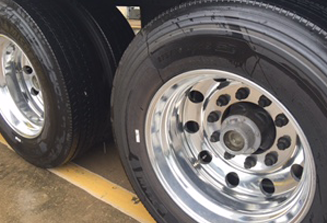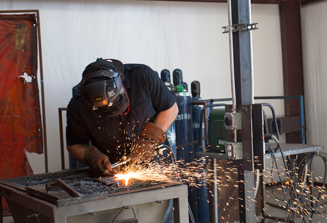From the Experts
Hear from the Experts on all things Trucking and Welding
-

Questions and Answers from the Trucking Community
Welcome to the Message Board. This page is a collection of messages posted by drivers in the trucking community, who have shared Questions and Answers on trucking forums across the internet. Updated regularly, please check back often. “Moving from driver to O/O [Owner/Operator] is more business sense than it is driver skill. Go talk to S.C.O.R.E or the local office listed at the bottom of this page. Microloan Program | The U.S. Small Business Administration | SBA.gov The folks in the "Participating Intermediary Microlenders Report" link They will work with you to help figure out how to get into a truck etc, write a business plan (it can be as simple as a napkin or more complicated). Financial statements etc. In short, they will give you a quick lesson in business management.” --User “mndriver,” offering advice (and reference links) to a driver with five years of Class A experience who is asking for advice on starting his own trucking company, at Truckers Forum.net.
“Read everything. Speed limits, restrictions, routing instructions, Bill of landings, owner’s manual to your truck, messages from dispatch, I mean everything…it’s usually al there somewhere.” --Oldman49, responding to a user requesting advice on making their trucking career as smooth as possible, on a thread at The Truckers Report.
“1. Keep paper towels on the truck 2. Keep wet wipes on the truck 3. Keep some canned food on the truck 4. Keep some water / soft drinks on the truck 5. On hot days offer water/soft drinks to the guards or unloader/loader. You may get better treatment (especially if you have their favorite.) 6. Expect everyone in front of you to do something stupid and plan accordingly. 7. Don't be lax in your duty, but don't stress either 8. Promptly get your paperwork in 9. Present a professional image to the customer (you represent your company.) 10. Practice trip planning every day.” --Forum user “Salad,” in response to the thread “Any tips for a new driver?” on The Truckers Report,
“I want to be a trucker driver because..... It's time for me to do something I've always wanted to do. I've worked good jobs that I hated for all of my married life. It served me and my family well, and I was happy to do it, and have always been proud of the life my wife and kids enjoyed because I worked hard, even if I didn't like the work. But I've always wanted to drive long haul OTR, it's just that married life and two beautiful children sort of put that choice on hold. But those responsibilities have ended and now I can work at something that I think will suite [sic] me well. I enjoy the solitude of the road, while I wouldn't say I'm loner. I've always strived to have a minimal lifestyle. For me simple was always better. I'm going to enjoy not being in the same place every day, even if it looks the same (if you've seen 1 truck stop....) --User “BeanDip,” responding to a thread asking “Why do you want to be a truck driver?”
“You are going to need a year of driving, to just adapt to the lifestyle. Also, to develop your driving skills, and work relationship with your dispatcher, and learning how your company does business. None of this comes quickly, and your attitude is being closely watched. Remember...you are responsible for much of the business success or failure. Tremendous amount of money goes into that rig, freight, and contract with the client....and you are the backbone of it all.” User “Roadhog,” in a thread titled “The Driver and The Employer, Basic Job Hunting Skills,” on the Class A Drivers Message Board.
“Hello guys its been a week since I graduated cdl school, and I have already been offered a job…with a local milk delivery company driving Class B trucks (I have my Class A). I start tomorrow morning. For all the people asking if it’s possible to find a local job with no experience its possible you just have to put in some work. I…found out these companies’ contact information and office location and either called or just showed up with a simple resume and told them I’m looking for a Class A or B driving position and was straightforward about being straight outta CDL school (with) no experience I…went to a CDL staffing agency, where I was told that I would need at least a year experience and no one would hire me local I would need to go OTR. If you want a local job without experience, go out there and get it. Don’t just call or put an application in online, go down to the company and tell ‘em you want to work for them (they love this kind of initiative). Bring a resume with you, bring a copy of your driving abstract cdl & medical card.” --User “RedTheTrucker,” on the post “How to Find a Local Job with No Experience??” at The Truckers Report.
“Holding a CDL has made me a substantially better driver. Its corrected a lot of bad habits I never realized I had. I've acquired a lot of patience and no longer feel the need to speed in my car... I no longer feel the need to tailgate... I've garnered a great deal of tolerance for traffic... I love having the ability to decipher when a car or truck is about to do something stupid. I also read every single sign on the road now out of habit. My CDL has turned me from a decent driver to a professional driver.” --User “KiLLaZiLLa93,” responding to the question “Has your CDL made you a better driver?” on The Truckers Report.
“If it were me, would stay there another 6 months. Looks better on your home loan application also that you’re not a job hopper.” --User Chinatown, in response to a user who asked for advice on leaving his first trucking job six months after earning his CDL, at The Truckers Report. -

The PSP Scores Employers Want from Job Candidates
Do you know what the PSP is? If not, you may want to learn, because it can directly affect whether trucking companies will want to hire you. The Federal Motor Carrier Safety Administration (FMCSA) has instituted the Pre-Employment Screening Program for all truck drivers going forward. The PSP offers employers a snapshot of your driving record to make a hiring determination. The PSP assigns points to safety violations a driver has made during his time as a driver. Speeding tickets, reckless driving convictions, or inspection failures will “ding” a driver, adding points to his PSP. On the other hand, good inspection results and a safe driving record will cancel out those points. The PSP contains a driver’s crash data from the past 5 years, and roadside inspection data from the past 3 years. New snapshots are uploaded approximately once a month, meaning you have the opportunity to have a continuous stream of new data. While the notion of weeding out the bad drivers and rewarding the good ones seems to be a natural fit for the trucking industry, it can be a negative for drivers who have had bad luck. Companies may fear hiring a driver with a high PSP score to not be worth the risk of hiring, meaning that if you have had a string of bad luck you may find yourself having difficulty finding a job. Meanwhile, the program seems to be a success early on. The FMCSA reports that companies using PSP to screen their new hires have seen crash rates drop 8 percent, and driver out-of-service rates dipping by 17 percent on average. New drivers especially will want to take note of their PSP score, particularly before they decide to change jobs. An accident or two, or a bad inspection or two, could derail your plans for advancement. Be sure you are especially diligent about your pre-trip inspection reports, and that you do your absolute best to avoid accidents. If you want to know more about the PSP and how it can affect your ability to get a job in the trucking industry, visit the FMCSA’s PSP website at this link. -

Tire Traction Control and Fuel Economy Research
The trucking industry news site Trucking Info has a video feature on their visit to the Goodyear Tires proving grounds in San Angelo, Texas, where they conduct testing on tires, including those designed for tractor trailers. The testing facility sits on 7.000 acres of land, where the company conducts testing on such areas as traction control, fuel economy, and durability. The company provides and quality control on both their own tires and those of competitors. The video breaks down several control tests Goodyear conducts as they continue to develop and improve on their product and develop tires that offer peak performance in a variety of areas, doing their part to make life on the road safer for truck drivers. To view the video and more trucking industry news, visit Trucking Info at this link. -

Overcoming Welding Limitations
A post at Laboratory Network outlines how material scientists in Argonne, IL’s Argonne National Laboratory have developed a way to weld components made of high-temperature superconductors. The bond that results from this welding technique is strong enough to preserve uniform electrical flow across the joints and can be used for current leads, fault current limiters, energy storage devices, high-energy-density motors, and high-current wire or cable. Discovered in the 1980s, superconductors are known for losing electrical resistance when cooled with liquid nitrogen. However, superconductors do hold the potential for generating more efficient magnetic fields and transmitting electricity without losing resistance. Thus far researchers have been unable to grow large high-performance superconducting structures that are able to uniformly carry current, and they have found it difficult to join smaller sections together without interfering with electrical flow. The hope by researchers is that a new welding process may overcome this limitation. The new welding process will bond pieces of yttrium-doped barium-cooper-oxide (YBCO) using layers of thulium-doped barium-copper-oxide (TmBCO). The melting point of TmBCO is about 20 degrees Celsius cooler than YBCO. The materials are then heated to a temperature about mid-way between the two melting points. The YBCO “seeds” the liquefied TmBCO, while the joint cools, which provides a template at the TmBCO interface as it cools. This leads to a weld that preserves the YBCO crystal structure to a mechanically-strong weld that carries high current. While superconductors are materials that lose resistance to electrical current at reduced temperatures, the first of those identified were made of metals that became superconductive when they were brought near absolute zero (-270 degrees Celsius). The high-temperature superconductors found in the ‘80s lost its resistance at temperatures that allow the use of refrigerants such as liquid nitrogen. YCBO, on the other hand, becomes superconductive at -181 degrees Celsius. If you are interested in more information on this topic, you should read the original article by clicking here. Independent Welding Distributors Coop hires new hard goods product manager In hiring news in the welding industry, the Indianapolis, Indiana-based Independent Welding Distributors Cooperative (IWDC), a cooperative of independent welding distributors, has named Sean Norton their new hard goods product manager. In this role, Norton will be responsible for driving the growth of key programs, vendor partner brands, and the Weld mark brand, according to an article in The Fabricator. The IWDC was formed in 1994 to leverage the strengths of independent welding distributors across North America. The company’s heritage dates back to 1948, when the IWDA was founded. That company served the industry for many years before becoming the IWDC in 1994 as a larger cooperative that had additional means to serve the industry. Member companies look to the IWD for industrial, specialty, and medical gases, along with related equipment, hard goods, and consumables. The distributors use their national sphere of influence to aid in purchasing and marketing programs. The IDC features a footprint of more than $2 billion in retail sales over more than 260 locations. Before coming to the IWDC, Norton spent 15 years at ESAB Victor as district manager for Victor Technologies, mostly working in the Midwest. He now joins the welding cooperative as hard goods product manager, a move that will give him additional responsibilities in the industry while allowing him to increase profitability for the company. For more on the Independent Welding Distributors Cooperative (IWDC), you my visit their web site here. The Fabricator is a publication of the Fabricators and Manufacturers Association, Intl., which works with welding and fabricators, providing industry news and updates designed to serve people who work in the welding and fabrication industries. For more about The Fabricator and the welding industry it serves, visit their website by clicking this link. -

Demand for Truckers Continues to Grow
There are many reasons to consider a new career as a professional truck driver. The commercial truck industry plays an important role in the national economy which should give drivers a sense of accomplishment. In a column published by Tire Review, Bob Costello, president of the American Trucking Associations wrote about the important role the trucking sector is playing in today’s economy. “There is no industry more essential to the health and welfare of the U.S. economy than the trucking industry,” Costello wrote. “America’s trucks move the vast majority of America’s freight – from farm to factory to warehouse to retailer to home, trucks dominate freight transportation.” Costello added that “When looking at the industry, it is important to appreciate its size. According to the Department of Transportation, there are more than one million interstate motor carriers – including for-hire, private fleets and owner-operators. And those carriers moved 9.7 billion tons of freight in 2013 – nearly 70 percent of all the tonnage moved by trucks.” With trucks playing such an important role in the national economy, becoming a professional truck driver could be a great way for you to enter a profession that allows you to make a difference and feel good about the work you are doing. “Every grocery store, shopping center, car dealership, bookstore or pharmacy gets their goods via truck,” Costello wrote. “And in today’s on-demand economy, every time a person clicks the checkout button on an online retailer, another bit of freight is put on the back of a truck. Trucking is a $681 billion industry; more than 81 percent of all freight-related dollars were paid to the trucking industry. With more than 3.2 million drivers – and 7 million employees overall – trucking really is the lifeblood of the U.S. economy.” The size and growth of the trucking industry is another reason why this is a great career opportunity. The truck industry continues to grow and there is a need for thousands of more CDL trained commercial truck drivers. In fact, the demand for more drivers is so great that many truck carriers are looking for ways to entice more drivers through higher pay and tuition reimbursement for CDL programs. “Con-way Truckload is rolling out a new tuition reimbursement program to entice new drivers to work for the company after attending a professional driving school,” reports TruckingInfo.com. “The program will contribute up to $4000 to students attending or enrolling in a professional driving school to earn a commercial driver’s license. A full-time position at Con-way will be offered upon graduation and a driver must work for Con-way for a year to receive the full amount.” Demand for trucking services continues to grow across the country. However, truck carriers are struggling to find enough qualified driver to meet that demand and its forcing trucking carriers to look for creative ways to encourage more individuals to consider a career as a commercial truck driver. “Professional truck drivers are essential to our nation’s economy and with the current driver shortage, we’re looking for more ways to help bring new professionals into the industry,” said Bert Johnson, vice president of human resources at Con-way. In its article, TruckingInfo.com reported that “Conway will make monthly payments on a student’s loan for the first 12 months of employment with the company. After the year is up, the rest of the reimbursement will be paid in a lump sum. The new program replaces Con-way’s previous tuition assistance program that gave $2,000 reimbursements.” As truck carriers continue to look for thousands of new truck drivers, now is the perfect time to launch a new trucking career. The CDL training program at Advanced puts students at the top of the list for some of the best truck driving jobs in the country and is helping hundreds of jobseekers launch a new career in one of America’s fastest growing employment fields. The quality of education at Advanced can help many students graduate from the CDL training program with multiple job offers and opportunities. This is a great time to consider a new career as a professional truck driver, especially as the industry continues to grow and truck carriers increase their incentives for new drivers.

